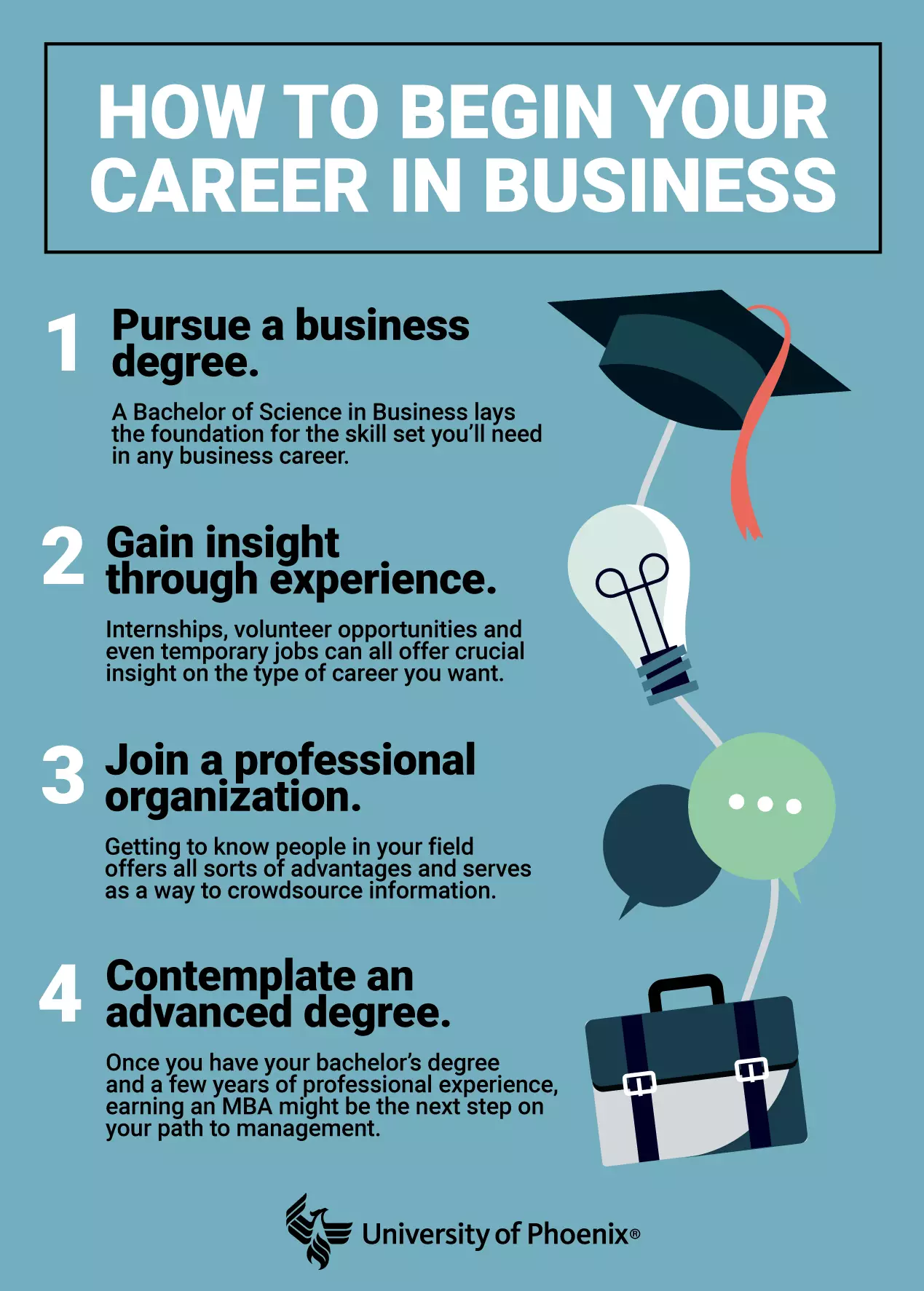Careers for MBA graduates

Written by Elizabeth Exline

Reviewed by┬ĀKathryn Uhles, MIS, MSP,┬ĀDean, College of Business and IT

What to consider about careers for MBA students
Before researching careers for MBA graduates, take a look at what this degree entails. A┬ĀMaster of Business Administration, or MBA, is a graduate degree that delves into the subject of business management and administration. Courses tend to focus on critical thinking and effective management. This program aims to prepare graduates to lead organizations of any size into the future.
When it comes to education, there's no one-size-fits-all approach. But the degree track that possibly comes the closest is the┬ĀMBA. Covering such skills as management, decision-making and leadership, this degree prepares for a variety of careers for MBA grads, including roles in business operations, management and administration.
The MBAŌĆÖs versatility may also account for its popularity among students. While recent reports suggest a decline in overall applicants for MBA programs, it has historically outperformed most masterŌĆÖs programs. In the 2021-22 academic year, more MBAs were conferred (202,334) than any other masterŌĆÖs degree, according to the┬Ā. Only the health professions and related programs came close with 142,025 masterŌĆÖs degrees conferred.
Like the utility of an MBA, which is diverse and evolving, earning an MBA is a process with many opportunities for customization. Things to consider while deciding to pursue his degree may include:
- Is a full-time or a part-time program more desirable?
- Is there a competency-based Master of Business Administration program┬Āfor an expedited experience?
- Can the MBA be customized with a certificate in accounting or human resources?
Depending on the answers, an online MBA could offer the right level of flexibility and skills that can enhance a career. LetŌĆÖs explore whatŌĆÖs possible when it comes to getting an MBA and putting it to work after graduation.
Is an MBA worth it?
The decision to┬Āpursue a Master of Business Administration┬Āand careers for MBA graduates depends on individual goals. Not only can it teach new skills but it may also provide networking opportunities.
An MBA can help distinguish a graduate in a particular field and can demonstrate a commitment to learning. It canŌĆÖt guarantee professional success, but it can lay a strong foundation ┬Āto pursue ┬Āa desired career path.
Ultimately, for those seeking to enhance a career in business with a leadership role, or planning to start ┬Āa company someday, an MBA might be a smart move.
Three careers for MBA graduates
An MBA doesnŌĆÖt limit you to one industry or role. In fact, many professionals use an MBA to potentially enhance their career. MBA programs can help prepare you for these and other professions:
1. Business manager
- Overview:╠²Business managers┬Āplan and oversee measures that help their organizations achieve optimal efficiencies. Areas that may fall under their jurisdiction include budgets, marketing, business strategy and personnel.
- National median salary:╠²As of May 2023, according to the U.S. Bureau of Labor Statistics (BLS), business managers earned between
- Education requirements: A bachelorŌĆÖs degree and related work experience are customary. Specific employers may require an MBA.
- Job outlook: The projection is for┬Ā┬Ābetween 2022 and 2032, according to BLS.
Salary ranges are not specific to students or graduates of ░«╬█┤½├Į. Actual outcomes vary based on multiple factors, including prior work experience, geographic location and other factors specific to the individual. ░«╬█┤½├Į does not guarantee employment, salary level or career advancement. BLS data is geographically based. Information for a specific state/city can be researched on the BLS website.
BLS Occupational Employment Projections, 2022-2032 is published by the U.S. Bureau of Labor Statistics. This data reflects BLSŌĆÖ projections of national (not local) conditions. These data points are not specific to ░«╬█┤½├Į students or graduates.
2. General and operations manager (GM)
- Overview: General managers are often responsible for multiple departments and may be required to formulate policies and manage daily operations. Like GMs, operations directors have a diverse set of skills and job duties that are difficult to classify, although these tasks may occur at an organizational rather than store or location level. They may help draft company policy, direct operations and plan HR strategies.
- National salary range:╠²┬ĀAs of May 2023, general and operations managers earned┬Ā, according to BLS.
- Education requirements: Most management roles require a bachelorŌĆÖs degree at minimum. Specific employers may require an MBA.
- Job outlook: A projected┬Ā┬Ābetween 2022 and 2032, or roughly 147,300 jobs, according to BLS.
3. Administrative director
- Overview:╠²┬Āoversee and coordinate a companyŌĆÖs daily operations. Their responsibilities include developing administrative practices, including records management, and training protocols. In some smaller organizations, an administrative director might handle the duties of a chief executive officer or chief operations officer.
- National salary range:╠²As of May 2024, administrative services and facilities managers earned┬Ā, according to BLS.
- Job outlook:┬ĀBLS projects this occupation to┬Ā┬Ābetween 2022-2032.
How to get an MBA
To get an MBA, students need a bachelorŌĆÖs degree first. Then one must apply to their program of choice. How many units or credits it takes to complete an MBA may depend on whether applicable credits were transferred or not.
Finding the right MBA program means evaluating both your situation and your goals.┬ĀIndependent learners with professional experience and a penchant for a self-led format may also consider a competency-based MBA program. This program is designed for experienced professionals who can demonstrate proficiency in business leadership.┬Ā
MBA programs can take as little as 16 months to two years or more. Competency-based programs can be as little as one year. Eligible transfer credits can reduce both traditional and competency-based MBAs.
Once upon a time, aspiring MBA students couldnŌĆÖt contemplate graduate school without taking either the Graduate Management Admission Test (GMAT) or the Graduate Record Examination (GRE). The happy ending to that story is that such standardized exams are no longer universally required.
How to prepare for an MBA program
Students will need more than a strong internet connection to successfully complete an MBA program. Here are ways to prepare for MBA courses:
- Establish good┬Ātime management skills.
- Manage expectations ŌĆö there will be papers, tests and deadlines to meet┬Āon top of┬Āany current obligations. Plan accordingly.
- Get financials in order, from completing the FAFSA┬«┬Āon time to applying for any scholarships ahead of time. The fewer financial surprises along the journey, the better.
Online programs aligned with careers for MBA students
If youŌĆÖre looking to take the first step toward expanding your business knowledge and skill set to pursue careers for MBA graduatess,┬Ā░«╬█┤½├Į offers a Master of Business Administration in as little as 16 months online, and a Competency-Based MBA in as little as one year. Neither program requires a GMAT or GRE.
For more information about what you can do with an MBA, watch this . Contact ░«╬█┤½├Į for more information about its MBA program.

How to begin your career in business
- Pursue a business degree.┬ĀA Bachelor of Science in Business lays the foundation for the skill set youŌĆÖll need in any business career.
- Gain insight through experience. Internships, volunteer opportunities and even temporary jobs can all offer crucial insight on the type of career you want.
- Join a professional organization. Getting to know people in your field offers all sorts of advantages and serves as a way to crowdsource information.
- Contemplate an advanced degree. Once you have your bachelorŌĆÖs degree and a few years of professional experience, earning an MBA might be the next step on your path to management.

ABOUT THE AUTHOR
Elizabeth Exline has been telling stories ever since she won a writing contest in third grade. She's covered design and architecture, travel, lifestyle content and a host of other topics for national, regional, local and brand publications. Additionally, she's worked in content development for Marriott International and manuscript development for a variety of authors.

ABOUT THE REVIEWER
Currently Dean of the College of Business and Information Technology,┬ĀKathryn Uhles has served ░«╬█┤½├Į in a variety of roles since 2006. Prior to joining ░«╬█┤½├Į, Kathryn taught fifth grade to underprivileged youth in ░«╬█┤½├Į.
This article has been vetted by ░«╬█┤½├Į's editorial advisory committee.┬Ā
Read more about our editorial process.





